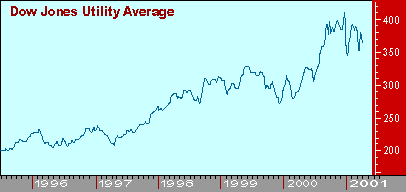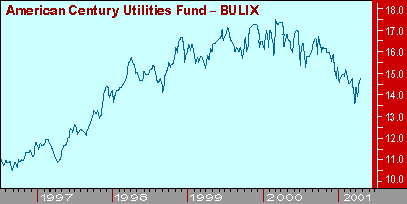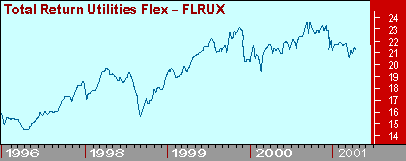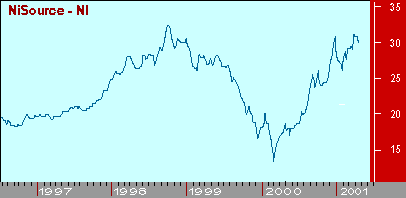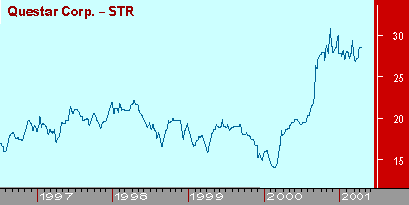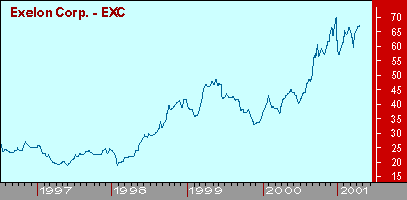
HOT TOPICS LIST
- Strategies
- Stocks
- Buy
- Investing
- Brokers
- Psychology
- Interviews
- Accumulate
- Sell
- Hold
- Spotlight
- Websites
- Candlestick Corner
- Gold & Metals
- Options Trading
LIST OF TOPICS
MUTUAL FUNDS
Can You Profit From The Energy Crisis?
05/30/01 03:10:20 PM PSTby David Penn
From telecommunications to electric power, deregulation in the utilities industry is opening up a wealth of opportunities - and challenges - for retail investors.
| How much energy does it take to power a new economy, anyway? Few were asking this question back in the mid-1990s, when the prices for light crude oil were relatively low and both heating oil and unleaded gas prices were recovering from Gulf War-era spikes. But the boom and bust of the Great Bull Market has brought with it what Energy Secretary Spencer Abraham called a "serious crisis" in energy, suggesting that both the US economy and national security are increasingly at risk unless the country meets its energy demands. Evidence of the energy squeeze abounds. Consumer advocacy groups are criticizing rate hikes by utilities, some of which are teetering on the brink of bankruptcy while others are reaping near-record profits. Environmentalists may have succeeded in driving the Bush administration from its longed-for oil exploration effort in the Arctic National Wildlife Reserve, but new exploration off the coast of Florida is already under consideration. With President George W. Bush warning that a weakened economy needs a strong energy policy to avoid recession, many utilities are experiencing the twin challenges of soaring demand and a deregulation that has meant, in many parts of the country, that every utility must look out for itself. This presents a conundrum for the utilities investor looking for some measure of safety in the face of failed rallies and continued declines in the stock market. For every Enron (ENE) or Duke Energy (DUK) -- two energy wholesalers that have seen their earnings per share for the first quarter of 2001 jump 22% and 51%, respectively, over the previous year -- there is a Pacific Gas and Electric, the largest utility in California, which filed for Chapter 11 bankruptcy protection in April. This means that utilities investors -- and even investors looking simply to add utilities exposure to their portfolios -- need to be even more careful in order to select utility companies that are best poised to take advantage of a growing nation's demand for power.
The Dow Jones Utilities Average is an index of the leading large-capitalization utility companies. ELECTRIC COMPANIES AND WATERWORKS Traditionally, utilities have been considered safe-haven investments, best suited for the portfolios of kindly old grandmothers knitting their way through their golden years. The reasons for this label are sound enough: On average, utility stocks provide a higher dividend than most stocks in the Standard & Poor's 500, providing those with large utilities holdings in their portfolios a greater stream of dividend income than would be possible with other equities. As Joe Sterling, one of the managers of the American Century Utilities Fund (BULIX), notes, the predictability and steadiness of earnings historically is what helped the utilities industry earn its reputation as a defensive investment sector. "You had one big phone company and just a few large, energy-producing companies. And they were all regulated," he says. "And all that regulation was centered around price and rate of return. So you pretty much knew what you were going to get."
American Century Utilities Fund (BULIX) includes many telecommunications companies among its top holdings.
Flex Funds Total Return Utilities Fund (FLRUX) invests in traditional high-dividend utilities as well as newer utilities companies and telecommunications. But beyond the dividends and reliable earnings of utility stocks lies an even more compelling reason for their fundamental value as investments. For most people in the industrialized world, the reliability of sufficient electricity to power their homes and offices remains something very much taken for granted, as many in California have painfully learned. Says Lowell Miller, portfolio manager of Miller/Howard Investments, Inc., advisor to the Flex Funds Total Return Utilities Fund: "One of the reasons why people feel secure about utilities and one of the reasons why utilities are a secure investment is because it starts with the market they serve -- which is ubiquitous and addictive. You cannot live without utilities. What other company, really, has an opportunity to serve that kind of marketplace?" ALONG CAME DEREGULATION Until the early 1990s, utility stocks remained a safe, stodgy investment. However, as the economy of that time period declined, these "safe" investments were overpursued and became too widely held, as investors continued to shield themselves against an uncertain economy and listless stock market. In 1993, the combination of the Federal Reserve Board's interest rate-raising campaign and public anxieties about the movement to deregulate the utilities industry helped send utilities on a steep selloff that bottomed in the summer of 1994. Deregulation thus helped turn stodgy investments into hybrid growth and income vehicles of the 21st century. Adds Miller: "The public became misinformed by the media about deregulation and what it would mean. ... The combination of rising [interest] rates and this really terrible press, which was, as usual, thoroughly misinformed, caused considerable excess volatility on the downside in utilities." How did deregulation affect utility companies? First, think of what the utilities industry had been for decades: essentially, a limited monopoly. Municipalities allowed companies to distribute water, electric power, and natural gas to the public, giving the company exclusive access to a customer base on the proviso that rates would be kept in line by the governing municipality. For years, electric companies in the US managed the power business this way -- from generating power to transmitting power to substations to distributing power. Although specific deregulation initiatives varied from region to region, the main idea behind deregulation was to increase competition by allowing other companies to bid for a piece of the action. So while the initial generation of power would remain a monopoly, new companies -- and spinoffs from old ones -- could enter the market for transmitting and distributing power to the public. DEREGULATION PROS AND CONS Deregulation has had notable downsides, among which was the emergence of inadequate competitors who were eager to enter the market but lacked the capital, technological expertise, or managerial talent to effectively keep up. Support systems were often at risk as new processes and controls were necessary to compensate for the switch from a vertically oriented generation-to-distribution system to a much more flexible system involving "common carriers" -- the companies increasingly responsible for electric transmission and distribution. Deregulation also has a tendency to uncover the lassitude of those leading utilities whose declining revenues may have been overlooked for years. At the same time, one of the success stories of deregulation is the development of smaller, gas-powered plants -- the combined-cycle gas turbine -- built closer to population centers with large energy needs such as New York. Other states such as Pennsylvania have successfully deregulated their utilities markets and now have energy surpluses and lower electric prices. Even in California, where Miller believes the media largely got the story correct, "The pace of new plants coming on board ... is so rapid that within about two years California is going to begin becoming a net exporter of energy," he predicts. So in spite of the challenge to meet growing energy demands, deregulation has created a wealth of opportunities for energy entrepreneurs and investors as new, more efficient utilities companies are born and older companies search for unique ways to increase revenues in the new environment. PICKING POWER STOCKS As great an investment as utility stocks can be, choosing specific companies is no walk in the park. Says Miller: "You start with a really stable market, really stable technology, really stable product -- it's basically the best market in the world. Then the questions are, what kinds of companies, what quality of company, and how much are you paying for them?" Looking at some of the holdings in the Flex Fund Total Return Utilities Fund, which he manages through Miller/Howard Investments, Miller notes that many of the better companies in the utilities sector were deeply undervalued at the beginning of 2000 and have since doubled. "That doesn't mean that they are expensive," he says. "But you need to have more sensitivity to valuation than once was the case. [At the beginning of 2000] you almost could buy the story because the valuations were all great."
NiSource (NI) is the largest natural gas pipeline company east of the Mississippi River.
Questar (STR) is a Montana utility that owns one of the largest natural gas companies in the West. What does he like? NiSource (NI) is one company the fund has been keen on of late. NiSource, Miller says, "is the largest natural gas pipeline company east of the Mississippi River." He believes NiSource potentially stands to gain from what he calls "tremendous nationwide consolidation of pipeline companies." "I think NiSource ought to be valued at its potential merger and acquisition price, which would be 20 times the average of this year's and next year's earnings," he says. As of this writing, NiSource is valued at 14 times this year's and next year's earnings. The stock also pays a 4% dividend. "What we like is a really solid cash cow/cash flow utility that has some extra element of growth," Miller explains. "And for some years, we have felt that a wonderful extra element of growth would be [natural] gas, since all these new electric plants are powered by gas." One rising star in the utilities marketplace is natural gas, which is playing an increased role in US energy strategy. Natural gas is among the methods used to generate electricity (coal, oil, water, and nuclear -- not to mention solar and wind, to a lesser extent -- are others), but natural gas also has a number of direct applications such as powering appliances and heating homes. Natural gas has many advantages over other power sources, including the fact that natural gas resources are abundant and well distributed across the globe. It is a cleaner-burning fuel than oil or coal and is also much more efficient to extract, transport, and process than other fuels. Economic nationalists also have reason to cheer natural gas; according to the US Department of Energy, less than 10% of the natural gas consumed in the United States comes from outside of the country. Another company in Miller's natural gas catechism is Questar (Str), a Montana utility that is one of the largest and most diversified natural gas companies in the western US. Miller is especially sanguine on Questar: "I believe we will never again see" the low prices "that we once saw. And this company is extremely profitable." Questar is currently valued at 14 times 2002 earnings, which is about average for a utility. But it is not average for what Miller calls a utility with potentially the largest gas field in North America. "Nothing but success [is] coming out of the development of these gas fields," he says. "And there's so much use for it. It is behind all our electricity." Says Sterling, "We try to look for companies with basically stable cash flows and earnings, priced at a reasonable level." Calling the American Century Utilities Fund's approach a combination of value and momentum investing, Sterling and his colleagues use a multifactor screen that looks at valuation measures such as price to earnings, price to cash flow, and price to sales when selecting among utility companies. One stock that has passed his multifactor muster is Exelon (EXC), the company formed in the wake of the merger between Peco Energy and Unicom Corp. Sterling notes that while Exelon is a diversified energy provider, the company is "predominantly a nuclear power provider ... that should be able to take advantage of generally higher power prices into 2002."
Exelon Corp. (EXC) is poised to become a national energy provider, with 40,000 megawatts of energy-generating capacity. "Nuclear is the cheapest form of power, and Exelon is pretty well positioned to become a national energy provider," Sterling says. "[Exelon] has roughly 40,000 megawatts of generating capacity, and it's pretty low cost." While there are some, such as Miller, who steer clear of investments in nuclear power ("We are a socially responsible, socially screened fund. ... The risks to society seem to us to be so great that we don't want to be owners of nukes"), Sterling sees nuclear power as one of the options that will be pursued. Vice President Dick Cheney, Sterling notes, has stated that nuclear power should play a fairly significant role in the expanded energy-generating capacity of the US. (For more information on socially responsible investing, visit Working-Money.com.) INVESTING IN UTILITIES With regard to investing in utilities funds, "It's become very tricky," says Miller. The problem as he sees it is that the universe of utility funds has splintered into funds that are weighted heavily toward telecommunications (see the article on telecommunications investing elsewhere in this issue) and funds that are "predominantly old-line, high-dividend electric funds," and both kinds of funds are often referred to simply as "utility funds." Says Miller: "There's not really very much in between, except us. We're up when the electrics are up and up when the telecoms are up and not swinging wildly like the others do." Sterling also alludes to the trickiness of investing in utilities funds. Asked what investors can do to select better funds in the sector, he replies that "just making sure they are investing in what they think they are investing in" goes a long way toward preventing confusion and disappointment down the line. "People sometimes feel that some of the funds that are out there may be a little too telecom top-heavy. They thought they were getting the electric part, but really they were getting more telecom," he explains. POWER TO THE EARNINGS! While the stereotype of the safe-haven utilities investment is undergoing some serious revision, the new look of the utilities industry seems to suggest that earnings stability may actually give way to substantial earnings growth from a new breed of utility company. With deregulation on one hand and the growing demand for energy on the other (Sterling recalls that Cheney has predicted it will be necessary to build 50 new power plants a year for the next several years to meet anticipated energy needs), opportunities abound for efficient, energetic companies to develop new technologies and new methods for exploration and distribution of energy resources. Says Sterling: "There's always a fear out there that we may turn and move back toward regulation. That's one thing you would always want to keep an eye on." All the same, he doesn't consider utilities to be "politically sensitive" investments as such. "In any field, you're subject to some kind of government regulation. It's just a matter of whether you can see it readily," he says. "Regulation for the utilities industry is pretty much centered around price and reliability because these two services, power and voice access, pretty much dominate our daily goings-on," adds Sterling. "So the government has an interest to see that these things are provided at a reasonable rate and with good reliability." Lowell Miller puts it this way: "Utilities are actually more important for every waking moment of life, [more] even than government. If people had to choose between paying taxes and paying the utility bill, I don't think there'd be any question. They'd wait to get caught on the taxes, but they would pay the utility bill -- lest it get shut off." David Penn can be reached at DPenn@Traders.com. SUGGESTED READING Masover, Hal [2001]. "Socially Screened Investments," Working Money, Volume 2: April.
Copyright © 2001 Technical Analysis, Inc. All rights reserved. |
Technical Writer for Technical Analysis of STOCKS & COMMODITIES magazine, Working-Money.com, and Traders.com Advantage.
| Title: | Traders.com Technical Writer |
| Company: | Technical Analysis, Inc. |
| Address: | 4757 California Avenue SW |
| Seattle, WA 98116 | |
| Phone # for sales: | 206 938 0570 |
| Fax: | 206 938 1307 |
| Website: | www.traders.com |
| E-mail address: | DPenn@traders.com |
Traders' Resource Links | |
| Charting the Stock Market: The Wyckoff Method -- Books | |
| Working-Money.com -- Online Trading Services | |
| Traders.com Advantage -- Online Trading Services | |
| Technical Analysis of Stocks & Commodities -- Publications and Newsletters | |
| Working Money, at Working-Money.com -- Publications and Newsletters | |
| Traders.com Advantage -- Publications and Newsletters | |
| Professional Traders Starter Kit -- Software | |
PRINT THIS ARTICLE

Request Information From Our Sponsors
- StockCharts.com, Inc.
- Candle Patterns
- Candlestick Charting Explained
- Intermarket Technical Analysis
- John Murphy on Chart Analysis
- John Murphy's Chart Pattern Recognition
- John Murphy's Market Message
- MurphyExplainsMarketAnalysis-Intermarket Analysis
- MurphyExplainsMarketAnalysis-Visual Analysis
- StockCharts.com
- Technical Analysis of the Financial Markets
- The Visual Investor
- VectorVest, Inc.
- Executive Premier Workshop
- One-Day Options Course
- OptionsPro
- Retirement Income Workshop
- Sure-Fire Trading Systems (VectorVest, Inc.)
- Trading as a Business Workshop
- VectorVest 7 EOD
- VectorVest 7 RealTime/IntraDay
- VectorVest AutoTester
- VectorVest Educational Services
- VectorVest OnLine
- VectorVest Options Analyzer
- VectorVest ProGraphics v6.0
- VectorVest ProTrader 7
- VectorVest RealTime Derby Tool
- VectorVest Simulator
- VectorVest Variator
- VectorVest Watchdog

